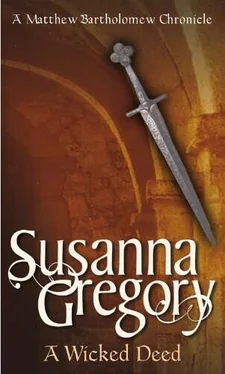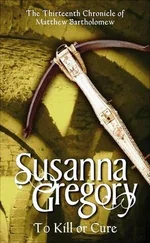Susanna Gregory - A Wicked Deed
Здесь есть возможность читать онлайн «Susanna Gregory - A Wicked Deed» весь текст электронной книги совершенно бесплатно (целиком полную версию без сокращений). В некоторых случаях можно слушать аудио, скачать через торрент в формате fb2 и присутствует краткое содержание. Год выпуска: 2010, ISBN: 2010, Издательство: Little, Brown Book Group, Жанр: Исторический детектив, на английском языке. Описание произведения, (предисловие) а так же отзывы посетителей доступны на портале библиотеки ЛибКат.
- Название:A Wicked Deed
- Автор:
- Издательство:Little, Brown Book Group
- Жанр:
- Год:2010
- ISBN:9780748124411
- Рейтинг книги:3 / 5. Голосов: 1
-
Избранное:Добавить в избранное
- Отзывы:
-
Ваша оценка:
- 60
- 1
- 2
- 3
- 4
- 5
A Wicked Deed: краткое содержание, описание и аннотация
Предлагаем к чтению аннотацию, описание, краткое содержание или предисловие (зависит от того, что написал сам автор книги «A Wicked Deed»). Если вы не нашли необходимую информацию о книге — напишите в комментариях, мы постараемся отыскать её.
A Wicked Deed — читать онлайн бесплатно полную книгу (весь текст) целиком
Ниже представлен текст книги, разбитый по страницам. Система сохранения места последней прочитанной страницы, позволяет с удобством читать онлайн бесплатно книгу «A Wicked Deed», без необходимости каждый раз заново искать на чём Вы остановились. Поставьте закладку, и сможете в любой момент перейти на страницу, на которой закончили чтение.
Интервал:
Закладка:
William gave a wolfish grin, revealing large, strong brown teeth. ‘It was kind of you to share that information with Alcote, Cynric. He has taken the wrong path.’
‘Will he be safe?’ asked Michael anxiously. ‘He has all our money.’
‘There is another village three miles down the Ipswich road,’ said Cynric, displaying remarkable memory for a man who had travelled to Suffolk only once, some twenty years before. ‘He can ask for directions there. The diversion will not take him too far out of his way.’
‘And it will be pleasant to escape his company, even if only for a little while,’ said William, smiling with glee. He hauled his donkey toward the Grundisburgh path, but the animal did not want to be led by the friar, either, and there began an angry duet of brays and curses.
‘God’s teeth!’ exploded Michael, as he watched Bartholomew continue to do battle with his horse. ‘Am I completely surrounded by imbeciles? Hold the reins near the bit, man! Cynric, help him, or we shall be here all day.’
He wheeled his own horse around and headed for the track Cynric had indicated, leaving the others to follow.
‘You should not have interfered,’ said Cynric, as he trotted next to Bartholomew.
‘But it is bad enough seeing people die because my medicine cannot help them, without seeing them die because someone else has decided they should not live.’
‘It is no good theologising with me, boy,’ said Cynric primly. ‘I am just a simple soldier who follows the law as well as he can. And the law does not look kindly on travellers rescuing criminals.’
‘I know,’ admitted Bartholomew wearily.
‘And soldiers try not to leave bodies lying around without a decent burial,’ continued Cynric, turning to give William a look of disapproval. ‘So neither should scholars. It is not proper.’
‘I agree,’ said Bartholomew. ‘But someone will be back for him soon — to collect his fine clothes and dagger, if nothing else.’
‘I was looking forward to arriving in Grundisburgh,’ said Cynric gloomily. ‘I have heard that they celebrate a three-day Fair, and it will be starting today. But there is nothing like a dying man to turn gaiety into ashes.’
‘Fairs are heathen occasions,’ gasped William breathlessly, as he bolted past them on the donkey he had finally managed to mount, and that was repaying him by galloping furiously along the track, grimly resisting his attempts to restrain it. ‘They are events celebrated by heretics!’
‘Nothing like a fanatical Franciscan to turn gaiety into ashes, either,’ said Bartholomew, as the friar and his donkey disappeared around a bend ahead of them.
Chapter 2
The pathway to Grundisburgh wound downward, and soon the scholars emerged in a pleasant, shallow basin, surrounded on all sides by gently rolling hills. The fertile valley bottom had been cleared of its scrub for farming, and neat, thin strips showed where crops of wheat and barley had been sown. It was rich land, with sandy soil that was far easier to plough than the clays to the north. The distant hillsides were dotted white with sheep, while the trees that marked the parish boundaries were still sprinkled with the pinks and creams of late blossom. In the morning sunlight, set against a clear, pale blue sky, the scene that stretched before them was one of peace and prosperity.
It was not long before Grundisburgh’s Church of Our Lady came into view. Initially, Bartholomew thought it unattractive: its flint tower was squat and sturdy, and only just taller than the pitched nave roof, while the main body of the building had narrow lancet windows punched into it, like arrow-slits in a castle. Yet the more Bartholomew looked, the more he appreciated its stark simplicity, and the timeless, brutal strength of the Norman belfry. It stood at the heart of the village, overlooking a swath of grass that formed a pleasant green, dwarfed by towering elm trees in which rooks cawed.
The green provided the villagers with communal grazing land, and straddled both sides of a shallow brook. There were no bridges, and the paths that met in the village centre dipped down to three muddy fords. Willow-tree branches cascaded to the water’s edge, offering cool, shady spots away from the glare of the sun. Opposite the church was a line of reed-thatched wattle-and-daub houses, some of which had smoke seeping from their chimneys as meals were prepared. The homely scent of burning wood mingled with rich soil and cooking food.
Michael was waiting for him in front of the church, smiling, while Father William pursed his lips in disapproval. Cynric had been right; the Pentecost Fair was in full swing. It centred on the green, which thronged with people, some sitting in groups under the trees, others gathered near a makeshift stage on which four enthusiastic musicians played energetic reels on a rebec, two pipes and a drum.
Near the church a pole had been erected, and children were skipping around it holding strips of coloured material. Bartholomew imagined the pole was supposed to end up neatly wrapped in the cloth, but the children were having far too much fun for anything so organised, and pelted round the tottering pillar at a speed that had most of them reeling with dizziness. Shrieks of laughter and the admonishing tones of an ignored adult drifted across the green. Someone darted forward as the pole began to list to one side, and rapidly became entangled in the children’s gaudy bands. His struggles to extricate himself made the pole more unstable than ever and in a shower of dirt the bottom flicked upward so that the whole thing toppled to the ground, and delighted children ran to fling themselves on top of it.
Bartholomew dismounted and stood next to Michael, content to watch the villagers at their revels for a while, before seeking out the generous Sir Thomas Tuddenham. Michael’s attention, however, was elsewhere. Bartholomew saw his keen gaze firmly fixed on a line of trestle tables, almost invisible under mounds of food — pyramids of bread loaves; a huge, golden — crusted pie surmounted by an oddly shaped pastry bird; a vat of something that looked like saffron custard; massive platters of meat delivered by a team of women who chattered noisily as they hacked up two roasted sheep; and a mound of brown-shelled eggs that stood higher than a man was tall. Bartholomew had not seen as much food in one place — including the market at Cambridge — since before the plague.
‘Right,’ said Michael, rubbing his hands as he assessed the quality of the fare with a professional eye. ‘We should make ourselves known before this feast starts, so that we can join in.’
Away to one side was a smaller table, covered by a spotless white cloth that was almost dazzling in the bright sun. Behind it sat a man, fifty or sixty years of age, with bristly grey hair, who wore a handsome blue capuchin and matching hose, and a shirt that was almost as brilliantly white as the tablecloth. He wore a somewhat fixed smile as he watched the children’s antics with the pole, revealing some of the longest yellow teeth Bartholomew had ever seen. His seat of honour led Bartholomew to suppose he was Sir Thomas Tuddenham, the lord of Grundisburgh manor, and the man who was to give Michaelhouse the living of his church.
Tuddenham had a woman on either side of him. The one to his right was elderly, and had almost as outstanding an array of amber fangs as did Tuddenham; Bartholomew assumed she was his mother. She had kindly eyes that went in slightly different directions, and her creased, walnut-brown face was framed by a wimple that had seen better days — no longer crisp and white, but cream-coloured and worn. Her shabby brown dress, offset by an unashamedly ostentatious brooch, suggested that she cared nothing for appearances, and set more store in personal comfort.
Читать дальшеИнтервал:
Закладка:
Похожие книги на «A Wicked Deed»
Представляем Вашему вниманию похожие книги на «A Wicked Deed» списком для выбора. Мы отобрали схожую по названию и смыслу литературу в надежде предоставить читателям больше вариантов отыскать новые, интересные, ещё непрочитанные произведения.
Обсуждение, отзывы о книге «A Wicked Deed» и просто собственные мнения читателей. Оставьте ваши комментарии, напишите, что Вы думаете о произведении, его смысле или главных героях. Укажите что конкретно понравилось, а что нет, и почему Вы так считаете.












